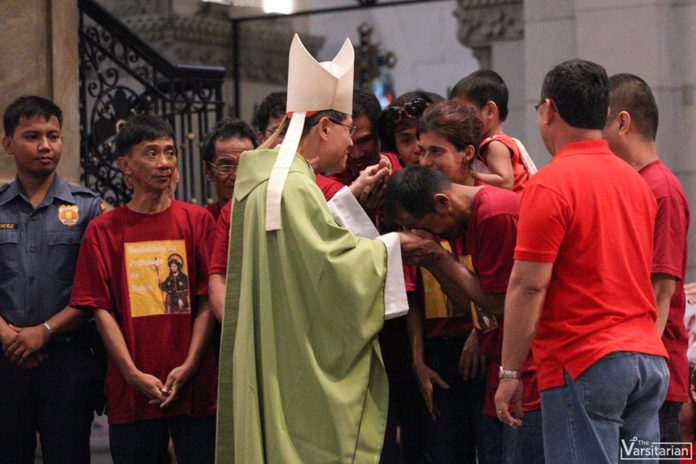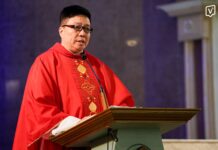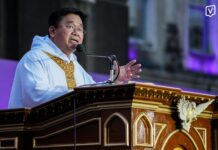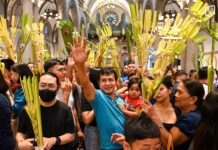
AMID THE rising number of deaths brought by President Rodrigo Duterte’s war on drugs, the Church maintains that comprehensive rehabilitation programs and cultural evangelization are sustainable solutions to the problem of illegal drugs.
Fr. Luciano Felloni, parish priest of Our Lady of Lourdes in Caloocan, said drug-rehabilitation programs serve as a “refuge” for drug dependents.
“This is a place for the people in the [police drug] watch list where they can somehow be protected and at the same time, eventually be removed from it,” Felloni, who initiated a drug-rehabilitation program in his parish, said in an interview with the Varsitarian.
Approved by the Philippine National Police (PNP), the rehabilitation program, which began in September 2016, runs for six months with professionals such as doctors, psychologists, psychiatrists and volunteers helping in the recovery of drug surrenderers.
“[I]n the first four months, patients may be negative or positive in drug tests. They can be negative for two weeks, and then relapse. But it gets to a point where they start to be negative in drug tests consistently. You need to count for two consecutive months. If anytime they relapse, they go back to zero and start counting again,” Felloni said.
Once registered as “drug-free,” the patient consults the parish’s resident psychiatrist, psychologist and doctor for a general assessment. A report subject for review will be given to the local government, Philippine Drug Enforcement Agency and the PNP.
Felloni said there are four stages of drug addiction and each stage is to be dealt with differently. The parish-based drug rehabilitation program caters to stages 1 and 2. Stage 1 is the experimental stage and is common among teenagers, while stage 2 drug addicts are drug-dependent yet still capable of withdrawing, with psychological and medical help.
Fr. Roberto de la Cruz, who leads the Restorative Justice Ministry of the Archdiocese of Manila, was also among the pioneers of a parish-based drug rehabilitative program. This was in response to the overwhelming number of deaths in the drug war, particularly during Oplan Tokhang or “knock and plead,” wherein police are only supposed to appeal to drug suspects to surrender. Some suspects however end up dead because of alleged shootouts with the police.
“When Tokhang began, ‘yung dami ng surrenderers started to escalate. We anticipated [that] it will have a domino effect kasi they will give names. So we met with [different government departments] for a community-based rehabilitation program bilang tugon sa drug surrenderers at communities,” de la Cruz said.
The Archdiocese of Manila, in partnership with the UST Psychotrauma Clinic, launched the “Sanlakbay sa Pagbabago ng Buhay” program—a six-month community-based rehabilitation program for persons in the police watch list under Oplan Tokhang.
De la Cruz, Sanlakbay project coordinator, said “manpower to break the stigma on drugs” and evangelization were necessary to help the surrenderers.
Both rehabilitation programs hold random drug-testing in between the sessions. People who finish the program will be cleared from the PNP watchlist.
Out of the 94 parishes in the Archdiocese of Manila, Sanlakbay has been implemented in only 14 parishes. Many barangay and Church officials fear the consequences of involvement in Duterte’s drug war.
Felloni’s community-based rehabilitation program will also be launched in Sta. Quiteria and Bagong Silang, the “biggest extrajudicial killing fields” in the country. Both areas are in the city of Caloocan.
“It is new so it is not yet [widely] accepted. Maraming takot to [be] involved. Malakas ang resistance that is why we need collaboration and commitment between the Church and the government. We need dialogue,” de la Cruz said.
War against the poor
Fr. Atilano Fajardo, who lived with informal settlers near railways, echoed Manila Archbishop Luis Antonio Cardinal Tagle’s pastoral letter published last Aug. 19, which urged Filipinos to reach out to the families of drug war victims.
Fajardo said sharing stories would encourage Filipinos to fight the culture of fear, and see the human dimension of the war on drugs.
“Pinapatay nila ang kalayaan natin. Dahil may culture of fear, walang nagsasalita. Ilang libo na ang namatay sa administrasyon ni Duterte at karamihan sa kanila ay mahihirap. Ilang libo ang pinatay na hindi dumaan sa testing,” Fajardo said.
Fajardo said the poor are deprived not just of due process but also of proper burial rites, which costs money.
“Ang problema sa Scene of the Crime Operatives at sa mga morgue, halos P70,000 ang kailangan sa imbestigasiyon at para matubos ang bangkay. Kaya napupunta na lang sa mass grave ang mga hindi natubos,” he said.
Felloni blamed poverty for the prevalence of illegal drugs in his parish.
“The root of poverty is very real. For many people, shabu has been a source of living. People think that it is expensive to use shabu. But it is not expensive, it produces money for the user. The selling of shabu is as organized as a small-scale pyramid,” he said.
To raise awareness on the injustices on the poor, Fajardo started the “Huwag Kang Papatay” movement in February 2016 to remind people to value life and transformation, which can happen through the Word of God.
“This is a form of cultural evangelization. The Word of God is informative and performative. What is stolen is dignity. We hope to reclaim the stolen dignity [through] this value-based advocacy,” said Fajardo.
Huwag Kang Papatay is also the battle cry of the Catholic Educational Association of the Philippines, wherein participating schools were invited to wear statement shirts last Sept. 8 during the feast of the nativity of the Virgin Mary.
‘Different perspectives, but in coordination’
Felloni believed the death of 17-year-old senior high school student Kian de los Santos in August during an alleged shootout with the police – later belied by closed-circuit television camera footage – served as a wakeup call.
“Ngayon gumigising na ang taong-bayan dahil kay Kian. It is like providence. For a long time, people were only seeing the problem of addiction from one perspective.”
As of August 2017, a total of 77 drug war-related deaths have been recorded in Our Lady of Lourdes Parish. All were attributed to motorcycle-riding suspects, who remain at large.
Felloni regarded the war on drugs as a “developmental issue” and can be resolved by “professional help.”
“This is a developmental issue. This has to be addressed in different perspectives, but in coordination, and not be in isolation. We need to be more professional in addressing the issue on drugs,” he said.
The death toll in the war on drugs has ballooned to 13,000 since the start of the government’s campaign against illegal drugs, up to September 2017. About 4,000 were killed in police operations while about 2,000 died in vigilante killings.The remaining 7,000 deaths linked to illegal drugs are homicide cases under investigation.












